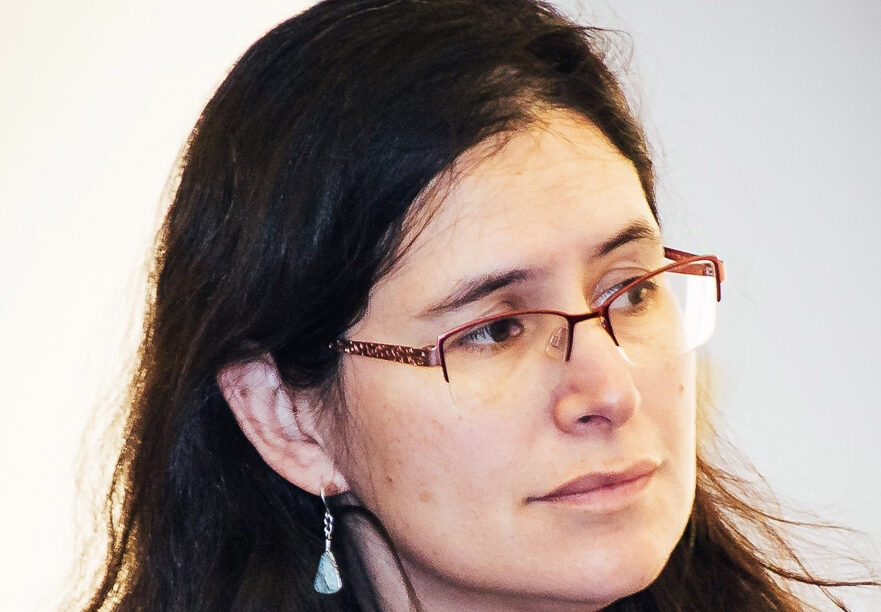The police decision to arrest protesters on a highway overpass in the heart of a predominantly Jewish neighbourhood of Toronto is raising alarm bells for Noa Mendelsohn Aviv, executive director of the Canadian Civil Liberties Association, who argues the ban may have gone too far.
“Where there are incidents of violence, aggression, police have a responsibility to protect the public… and that is one of the very important roles that they play. We just want to make sure that they remember and that the public remembers that police also have a responsibility to protect fundamental rights and freedoms as well,” Mendelsohn Aviv said in an interview with The CJN.
For weeks pro-Palestinian protesters have marched, set off smoke bombs and draped flags over a bridge on Avenue Road, overlooking Highway 401. Sometimes counter-protesters waving Israeli flags have come onto the bridge and the two groups have faced each other, separated by a line of police officers.
A few times, police closed the bridge to all traffic in an effort to de-escalate the situation, or escorted residents trying to enter the neighbourhood. In one incident that went viral, an officer was filmed serving as an intermediary, delivering coffee to a protester, while the bridge was closed to traffic.
The situation on the bridge escalated to such a fever pitch that Prime Minister Justin Trudeau met with Toronto Police Chief Myron Demkiw to discuss it in early January. In the end, at the Jan. 11 police services board meeting, Demkiw warned that protesters on that particular bridge could expect to be arrested.
“Considering all the factors that have transpired over the recent weeks, it is quite clear that our communities feel unsafe… particularly our Jewish communities in the immediate vicinity of the Avenue Road bridge,” Demkiw told reporters following the board meeting.
“There [are] a number of considerations as to the way events are unfolding in past weeks that give rise to a very serious concern for community safety and well-being related to that particular overpass,” over Canada’s busiest highway, he noted.
Two days after the chief’s announcement, three people were in fact arrested after protesting there.
But as upsetting as the protests were to the community, the ban may be an overreach, says Mendelsohn Aviv. And while the Jewish community feels particularly besieged these days, minority groups, including Jews, need to be especially vigilant about any infringements of their rights, she argues.
“Nasty, offensive speech has been said against many different groups, but it remains a critical piece of the fabric of rights and freedoms that protects the safety, the equality, the rights of minority and marginalized groups, more than not having it,” she said in an interview with The CJN.
While police have a responsibility to protect society from violence and aggression, the onus is on lawmakers to restrict individuals’ rights to the smallest degree possible, she said.
If the demonstrators were disrupting traffic, that could be minimized by allowing protests at certain hours, or only on the sidewalk, for instance, she said.
“There are ways of managing things that don’t involve a complete ban, like the one that Toronto Police have created.”
The pro-Palestinian protests have been held at numerous overpasses throughout the Toronto area, but the Avenue Road bridge, blocks from synagogues, Jewish schools and homes, seems to have attracted the largest numbers and most vociferous demonstrators.
Residents and local politicians have called out the protests as antisemitic, saying they target Jewish families who have nothing to do with Israeli government policy.
Neighbours have said the masked demonstrators, and the chants of “From the river to the sea,” and “We don’t need you Zionists” amplified over loudspeakers are intended solely to intimidate and harass them.
Mendelsohn Aviv points out that only one arrest, for uttering threats, was made during the numerous weeks of protest on the bridge. The subsequent three arrests, for mischief and obstructing a peace officer, occurred after the ban on protests was announced and relate to that ban
She warns that it’s a slippery slope, especially for minority groups, if government starts regulating where protests can take place or what people write on their signs.
“It’s going to get very dangerous if we put it in the hands of the majoritarian government to decide which content is allowed and which content isn’t allowed. Do we want our government controlling which speech is okay and which isn’t?” she asks.
The CCLA was born at a time when companies were allowed to post help wanted ads specifying that only men could apply for sales jobs and ‘No Jews Allowed’ signs could be seen in Canada.
That history of discrimination explains why minority groups should be especially wary of any moves to abridge their freedoms, she says.
“That commitment to equality is one of the pillars of our organization. There may be disagreements about this particular moment, this particular ban, but our common purpose is a society that we are aspiring toward, that is free and just and equal.”
The CCLA is one of two organizations currently fighting Quebec’s religious symbols ban, which has seen public servants, including teachers, prohibited from wearing head coverings such as a kippah, hijab or turban.
Mendelsohn Aviv draws a straight line from the Avenue Road bridge to the fight for religious freedom in Quebec.
“You shut down one freedom and it affects a lot of people and a lot of situations well into the future and it sets a dangerous precedent, similar to the kinds of shutdowns of freedoms that we have seen in Quebec that are affecting many different religious minorities, including very much the Jewish community,” she said.
“And that’s why we have to remain vigilant and that’s why we have to stand up and protect that tapestry of rights and freedoms, that are all part of that package.”
Learn more on The CJN Daily, with Ellin Bessner.
